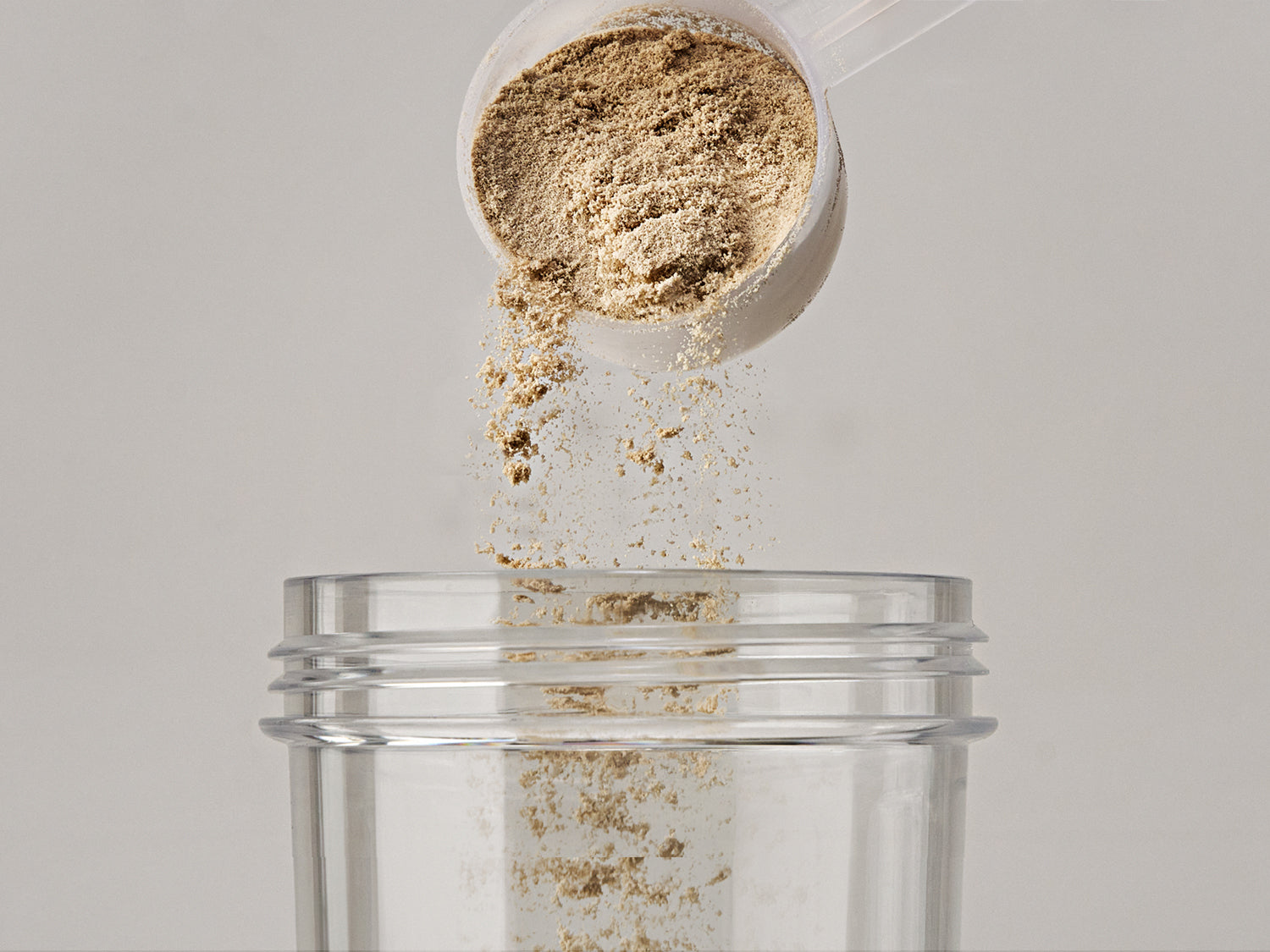Discover the difference between BCAAs and Creatine and how each could help you optimize your training based on your goal.
In fitness and performance, supplements can be crucial in optimizing the magnitude and speed at which you see your training results.
The further and further you attempt to push performance levels and achieve your peak physical condition, the more critical it is to have a targeted supplementation strategy rooted in evidence-based practice.
Among the potential options for supplements today are Branch-Chain Amino Acids or "BCAAs" and creatine. Both of these supplements are looked at as potential performance enhancers and do so in different ways.
BCAAs consist of the amino acids Leucine, Isoleucine, and Valine. (1) They are among the nine essential amino acids for muscle protein synthesis and energy production.
However, since the body cannot synthesize them, they must be consumed in the diet or supplemented. (1)
Studies show that BCAA supplementation may positively impact reducing muscle soreness and stimulating muscle protein synthesis ( , and thus, it is favored by athletes and many fitness enthusiasts.
Conversely, creatine, usually consumed as creatine monohydrate, primarily increases strength and power and aids muscle recovery.(4,5) Creatine is a naturally occurring compound found in foods such as red meat. (5) However, increasing creatine content in the muscle via supplementation can provide an ergogenic effect.
Since both of these supplements are popular in the marketplace, it is essential to understand their differences and how each may affect your fitness journey.
In the following article, we'll explore the different mechanisms, benefits, and considerations regarding BCAAs and Creatine so you can make an informed decision and craft an individualized supplementation protocol based on your goals.
Table of content
Should You Take BCAAs or Creatine?
The Key Differences between BCAAs and Creatine
Knowing the critical differences between BCAAs and Creatine is crucial for crafting your supplementation protocol. Although the two supplements are well known, they are different from a mechanism standpoint. BCAAs primarily influence protein synthesis and provide the necessary components to recover from training and muscle growth. (1)
However, creatine supplementation aims to thoroughly saturate the muscle's creatine stores to provide more substrate availability for the production of Adenosine Triphosphate (ATP), the body's energy currency. (5)
Creatine supplementation will aid in improved performance of high-power and explosive tasks such as weightlifting or bodybuilding.(4)
Also Read: Does Creatine Make You Gain Weight?
Ideal Users of BCAAs
Since BCAAs primarily involve additional amino acids in an athlete's "amino acid pool," they would ideally lend themselves to someone who finds it challenging to consume adequate amounts of protein in their diet.
Additionally, if you are a long-duration conditioning athlete, such as a runner, or compete in functional fitness, you may want to consider a BCAA supplement. BCAAs may assist you in reducing muscle soreness and overall muscle breakdown during long-duration exercise. (2)
Ideal Users of Creatine
Anyone with performance or aesthetic-related goals in fitness could benefit from adding creatine to the supplementation protocol. Due to its effect on your ability to train at higher intensities and volumes, consistent supplementation will yield improvements in muscle mass, strength, and power and aid your ability to recover. (4,5)
However, because creatine supplies fuel for high-energy substrates, athletes who engage in high-intensity or rapid movements—such as weightlifters, sprinters, and field/court athletes—will benefit the most from creatine. (4,5)
Also Read: What Foods Contain Creatine?
Combining BCAAs and Creatine
Fortunately, taking BCAAs and creatine do not have to be mutually exclusive since they operate under different mechanisms. There is no research supporting conflicts with absorption when taken together.
A potential dosing strategy when taking the two supplements could be consuming BCAAs before your session to provide amino acids into the bloodstream to decrease muscle damage and soreness.
This will be followed by consuming your creatine supplement after you train to help refuel creatine stores and prepare for your next training session.
Doing so can create a powerful combination of fueling for training, providing additional resources for the body to recover, and mitigating adverse effects of exercise, such as muscle breakdown and soreness. (1,2,3,4,5)
Understanding BCAAs
Role of BCAAs in Protein Synthesis
Muscle protein synthesis is a fundamental mechanism for muscle growth and repair. After a hard training session, the muscles are primed and ready to absorb the essential nutrients needed for this process to occur. With adequate protein intake and amino acid ingestion, muscle protein synthesis will occur. (1)
The BCCAs, however, play a critical role in stimulating muscle protein synthesis, especially the amino acid leucine. (1) Once enough leucine is ingested post-workout, the muscle repair process will begin. (1) This is called the leucine threshold, typically around 2-3 grams of leucine, and can usually be ingested with 20-40g of protein. (1)
By achieving these amounts post-training and several more times throughout the day within your typical diet, you can maximize protein synthesis for optimal muscle growth and performance.
Also Read: What Does Creatine Do for Women?
Sources of BCAAs
BCAAs are naturally present in many protein-rich foods, such as meat, poultry, fish, and dairy products, and some plant sources, such as legumes. (1) A diet with plenty of animal products like these can help you achieve ample amounts of BCAAs.
However, in the presence of food scarcity, dietary preferences, and the need for supplementation for performance-level goals, supplementation with BCAAs may be warranted.
From a cost and satiety perspective, it can be challenging to consume large amounts of meat products when your protein goals become much higher than those of the average individual.
Choosing a BCAA supplement can provide a cost-effective and more accessible avenue to introduce additional BCAAs into your system.
Benefits of BCAAs
In the presence of adequate protein intake, BCAAs have been shown to reduce muscle soreness after exercise and reduce muscle damage during exercise. (2,3)
This enhanced recovery and reduced soreness can indirectly facilitate more frequent and higher-intensity training sessions, which, over time, will compound into more significant gains in progress.
Additionally, BCAAs can serve as an additional energy source for prolonged training sessions, such as those of long-distance runners. (2)
Also Read: Can I Mix Creatine with Pre-Workout?
Understanding Creatine
Creatine is a naturally occurring nitrogenous organic acid found within human muscle tissues. It provides the substrates necessary for the production of ATP.
A typical human who consumes regular red meat will have their creatine stores filled to roughly eighty percent capacity. (5) For those who do not consume red meat and do not supplement with creatine, creatine stores will be much less.
The process by which creatine provides ATP for the body is through the Phosphagen energy system. (5)The Phosphogen energy system is responsible for high-intensity and fast movements like sprinting. (5)
Although it is powerful, it cannot last very long, and therefore, having creatine stores that are fully saturated with creatine allows for decreased time to fatigue and better recovery between bouts of activity.
Also Read: When to Take Creatine ?
How Creatine is Naturally Produced in the Body
Creatine can also be synthesized within the body via arginine and glycine. (5) The endogenous (in the body) production of creatine ensures that a baseline level of creatine is available.
However, this in no way can provide the performance-enhancing effects that a high-quality supplement or optimized diet can.
Also Read: Should I Load Creatine or Not?
Sources of Creatine
Outside of popular creatine supplements, you can consume a lot of creatine in your diet with foods such as red meat and seafood.
Creatine Supplementation
If you're considering starting a creatine supplementation protocol, there is a right way to do so to maximize its benefits. For the first 5-7 days, you will load the creatine, usually as creatine monohydrate, by consuming 20g daily through 4 x 5g dosages, to saturate creatine stores thoroughly. (5)
Once this loading phase has been completed, you can then drop to a maintenance dose of 3-5g per day, ideal for consumption post-workout. (5)
Also Read: How Much Water Should I Drink While Taking Creatine?
Benefits of Creatine
Supplementing with creatine has a host of benefits, some of which extend beyond the gym floor. Below are some benefits you can expect when you begin creatine supplementation. (5)
- Improved training Tolerance
- Enhanced recovery
- Increased work capacity
- Increased anaerobic Threshold
- Increased muscle Mass & Strength
- Increase power
In addition to these benefits of taking creatine, emerging evidence supports that creatine supplementation can positively affect injury prevention and rehabilitation, exercise tolerance in the heat, neuroprotective effect, and even improve the overall health status of aging adults. (5)
Also Read: Best Creatine for Women [Top 5 Products]
Final Thoughts On BCAAs vs Creatine
As you can see, although BCAAs and creatine have overlap in the benefits that they can provide, they both operate on complimentary mechanisms. These two supplements should not be seen as opposing each other but as ones that can be combined to optimize your training, recovery, and performance long term.
Also Read: Should I Take Creatine on Rest Days?
Studies support the use of BCAAs for various populations to mitigate muscle soreness and recovery after training and muscle damage during prolonged endurance events. (2,3)
Creatine, however, is one of the most studied supplements on the market today. Time and time again, it has proven to be highly effective in improving muscle mass, strength, power, and recovery, in addition to the other benefits that I have mentioned above. (4)
It would be in your best interest to evaluate your current diet and supplement regimen and consider adding these two supplements to your protocol. Based on the current body of research, they can both yield big dividends and help you on your journey to becoming the fittest and highest-performing version of yourself!
References:
- Jäger, R., Kerksick, C. M., Campbell, B. I., Cribb, P. J., Wells, S. D., Skwiat, T. M., Purpura, M., Ziegenfuss, T. N., Ferrando, A. A., Arent, S. M., Smith-Ryan, A. E., Stout, J. R., Arciero, P. J., Ormsbee, M. J., Taylor, L. W., Wilborn, C. D., Kalman, D. S., Kreider, R. B., Willoughby, D. S., Hoffman, J. R., … Antonio, J. (2017). International Society of Sports Nutrition Position Stand: protein and exercise. Journal of the International Society of Sports Nutrition, 14, 20. https://doi.org/10.1186/s12970-017-0177-8
- Arroyo-Cerezo, A., Cerrillo, I., Ortega, Á., & Fernández-Pachón, M. S. (2021). Intake of branched-chain amino acids favors post-exercise muscle recovery and may improve muscle function: optimal dosage regimens and consumption conditions. The Journal of sports medicine and physical fitness, 61(11), 1478–1489. https://doi.org/10.23736/S0022-4707.21.11843-2
- Weber, M. G., Dias, S. S., de Angelis, T. R., Fernandes, E. V., Bernardes, A. G., Milanez, V. F., Jussiani, E. I., & de Paula Ramos, S. (2021). The use of BCAA to decrease delayed-onset muscle soreness after a single bout of exercise: a systematic review and meta-analysis. Amino acids, 53(11), 1663–1678. https://doi.org/10.1007/s00726-021-03089-2
- Chrusch, M. J., Chilibeck, P. D., Chad, K. E., Davison, K. S., & Burke, D. G. (2001). Creatine supplementation combined with resistance training in older men. Medicine and science in sports and exercise, 33(12), 2111–2117. https://doi.org/10.1097/00005768-200112000-00021
- Kreider, R. B., Kalman, D. S., Antonio, J., Ziegenfuss, T. N., Wildman, R., Collins, R., Candow, D. G., Kleiner, S. M., Almada, A. L., & Lopez, H. L. (2017). International Society of Sports Nutrition position stand: safety and efficacy of creatine supplementation in exercise, sport, and medicine. Journal of the International Society of Sports Nutrition, 14, 18. https://doi.org/10.1186/s12970-017-0173-z
- https://www.frontiersin.org/journals/physiology/articles/10.3389/fphys.2017.00390/full?fbclid=IwAR2VOa6zC7RWfOWfJPSd2PI1WWBe2HWDFgiHnZOvzhuBITF77Wu-pHuaC-0 [SS1]
- https://www.frontiersin.org/journals/physiology/articles/10.3389/fphys.2017.00390/full?fbclid=IwAR2VOa6zC7RWfOWfJPSd2PI1WWBe2HWDFgiHnZOvzhuBITF77Wu-pHuaC-0 [SS2]




